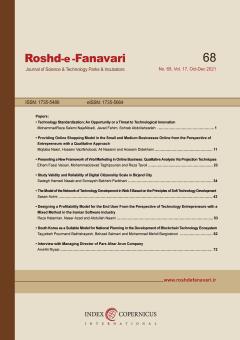South Korea as a suitable model for national planning in the development of blockchain technology ecosystem
Subject Areas : مديريت تکنولوژيMohammad Kazem Sayadi 1 * , Atefe Farazmand 2
1 -
2 -
Keywords: Blockchain TechnologyPolicymakingVertical BusinessesEcosystem Development RequirementsSouth Korea,
Abstract :
Blockchain is a distributed and intact database technology that can be used to store any data, including financial transactions, and has the ability to build trust in an unreliable environment. In the blockchain, trust is transferred from centralized intermediaries to technical infrastructure developers, leading to reliable transactions between nodes that are not necessarily trustworthy. Blockchain as a disruptive technology will affect the economy and governance in societies. Different blockchains run different governance mechanisms. All blockchains fall into a range that ranges from completely public and unlicensed blockchains such as Bitcoin to completely private and licensed blockchains. Blockchain, which is the basic technology of cryptocurrencies, will establish a new economic system by making deep changes in our communication methods over the Internet. This technology will change information security, transparency and governance. Due to the emphasis of this technology on security, trust and transparency, different sectors and different vertical businesses tend to use this technology. With the expansion of the use of this technology in different companies and countries, it is necessary to determine the country's plan to manage this technology. Therefore, it is necessary to determine the requirements for the development of the blockchain ecosystem in the country. In this article, we review the plan and strategy of South Korea as a model for the development of this technology in our country. Then, using the program of this country, we will present the requirements for developing the blockchain ecosystem in our country.
1- صادقی، محسن، و ناصر، مهدی، فناوری قراردادهای هوشمند، ابزاری در توسعه تجارت الکترونیکی: بایستهها و سیاستگذاریها، فصلنامه رشد فناوری، شماره 61، زمستان 1398.
2- دسترنج، نسرین، شناسايي عوامل مؤثر بر يادگيري فناوري در كشورهاي در حال توسعه، فصلنامه رشد فناوری، شماره 61، زمستان 1398.
3- Nofer M, Gomber P, Hinz O, Schiereck D, Blockchain. Business & Information Systems Engineering 2017, 59(3): pp.183–187.
4- Lee J. Y., A decentralized token economy: How blockchain and cryptocurrency can revolutionize business, Business Horizons Volume 62, Issue 6, November–December 2019, Pages 773-784.
5- Is there money to be made with blockchain technology? https://www.gartner.com/en/information-technology/insights/blockchain
6- Blockchain Market by Component (Platform and Services), Provider (Application, Middleware, and Infrastructure), Type (Private, Public, and Hybrid), Organization Size, Application Area (BFSI, Government, IT & Telecom), and Region - Global Forecast to 2025. https://www.marketsandmarkets.com/
7- Abu-elezz, A., Hassan, A., Nazeemudeen, A., Househ, M., & Abd-alrazaq, A. The benefits and threats of blockchain technology in healthcare: A scoping review. International Journal of Medical Informatics, Volume 142, 2020.
8- Kumar, N, & Aggarwal, S., Cryptocurrencies, Advances in Computers, Available online 29 September 2020, In Press.
9- Orjia, I. J., Kusi-Sarpong. S., Huang. S., & Vazquez-Brust. D. Evaluating the factors that influence blockchain adoption in the freight logistics industry. Transportation Research Part E: Logistics and Transportation Review Volume 141, 2020.
10- Kopyto. M., Lechler. S., Gracht. H. A., & Hartmann, E. Potentials of blockchain technology in supply chain management: Long-term judgments of an international expert panel. Technological Forecasting and Social Change, Volume 161, 2020.
11- Dutta. P., Choi. T., Somani. S., & Butala. B. Blockchain technology in supply chain operations: Applications, challenges and research opportunities. Transportation Research Part E: Logistics and Transportation Review Volume 142, 2020.
12- Min, H., Blockchain technology for enhancing supply chain resilience. Business Horizons, Volume 62, Issue 1, 2019, Pages 35-45.
13- Sunny. J., Undralla. N., & Pillai, V.M. Supply Chain Transparency through Blockchain-Based Traceability: An Overview with Demonstration, Computers & Industrial Engineering, In press, 2020.
14- Berdik, D., Otoum, S., Schmidt, N., Porter, D., Jararweh, Y. A Survey on Blockchain for Information Systems Management and Security. Information Processing & Management Volume 58, Issue 1, 2021.
15- Chen, F., Xiao, Z., Cui, L., Lin, Q., Li, J., & Yu, S., Blockchain for Internet of things applications: A review and open issues. Journal of Network and Computer Applications Volume 172, 15 December 2020.
16- Pólvora, A., Nascimento, S., Lourenço, J.S., Scapolo, F., Blockchain for industrial transformations: A forward-looking approach with multi-stakeholder engagement for policy advice. Technological Forecasting and Social Change Volume 157, 2020.
17- Unal, D., Hammoudeh, M., & Kiraz, M.S. Policy specification and verification for blockchain and smart contracts in 5G networks. ICT Express Volume 6, Issue 1, Pages 43-47, 2020.
18- MIST, “Summary of "Block Chain Technology Development Strategy”, Internet convergence policy director convergence new industry section, 2018. {In Korean}
19- Young-sil, Y. 2018. http://www.businesskorea.co.kr/news/articleView.html?idxno=23184 .
20- Raviv, P. 2018. https://cryptopotato.com/top-5-events-in-korea-blockchain-week-2018/.
21- Sharma, R. 2019. https://www.thefastmode.com/services-and-innovations/12562-kt-plans-to-launch-a-blockchain-powered-data-roaming-service-in-may-2018.
22- Dong-chan, J. 2020. http://www.koreatimes.co.kr/www/biz/2018/08/488_253573.html
23- korea blockchain association, 2020. http://www.koreablockchain.org/sub01.php?subp=b01
24- Raza, A. 2019. https://cryptocoin.news/news/altcoin/over-25-south-korean-cryptocurrency-exchanges-self-regulate-6552/
25- Asia Economy TV, 2020. http://www.bkc2018.com/forum_en.html
26- Radar, S. 2018. http://fintechnews.sg/20781/korea/most-promising-blockchain-startups-in-korea/
27- Jihyun, H. 2018. http://english.etnews.com/20180523200003

